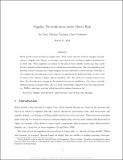Supplier Diversification Under Buyer Risk
Author(s)
Chod, Jiri; Trichakis, Nikolaos; Tsoukalas, Gerry
DownloadAccepted version (544.0Kb)
Open Access Policy
Open Access Policy
Creative Commons Attribution-Noncommercial-Share Alike
Terms of use
Metadata
Show full item recordAbstract
© 2019 INFORMS. When should a firm diversify its supply base? Most extant theories attribute supplier diversification to supplier risk. Herein, we develop a new theory that attributes supplier diversification to buyer risk. When suppliers are subject to the risk of buyer default, buyers may take costly action to signal creditworthiness so as to obtain more favorable terms. But once signaling costs are sunk, buyers sourcing from a single supplier become vulnerable to future holdup. Although ex ante supply base diversification can be effective at alleviating the holdup problem, we show that it comes at the expense of higher up-front signaling costs. We resolve the ensuing trade-off and show that diversification emerges as the preferred strategy in equilibrium. Our theory can help explain sourcing strategies when risk in a trade relationship originates from the sourcing firm, for example, a small-to-medium enterprise or a start-up; a setting that has eluded existing theories so far.
Date issued
2019Department
Sloan School of ManagementJournal
Management Science
Publisher
Institute for Operations Research and the Management Sciences (INFORMS)